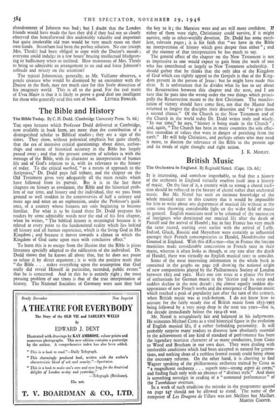British Music
The Orchestra in England. By Reginald Nettel. (Cape. 12s. 6d.)
IT is interesting, and somehow improbable, to find that a history of the orchestra in England virtually resolves itself into a history of music. On the face of it, a country with so strong a choral tradi- tion should be reflected in the history of choral rather than orchestral music. But Mr. Nettel has such an intimate knowledge of the whole musical scene in this country that it would be impossible for him to write about one department of musical life without at the same time throwing considerable light on the wider field of music in general. English musicians tend to be ashamed of the success:on of foreigners who dominated our musical life after the death of Purcell and the arrival of Handel ; but in fact France has very much the same record, starting even earlier with the arrival of Lully. Indeed, Gluck, Rossini and Meyerbeer were certainly as influential amongst their French contemporaries as Handel, Mendelssohn and Gounod in England. With this difference—that in France the foreign musicians made considerable concessions to French taste in their music, whereas it often looks as though, at any rate after the death of Handel, there was virtually no English musical taste to consider.
Some of the most interesting information in the whole book is contained in the graphs on page 258 showing the national origin of new compositions played by the Philharmonic Society of London between 1823 and 1912. Here one can trace at a glance the fever of enthusiasm for German music in the 'thirties and its steep and sudden decline in the next decade ; they almost equally sudden dis- appearance of new French works and the emergence of Russian music which reached a peak of popularity just after the turn of the century, when British music was at rock-bottom. I do not know how to account for the fairly steady rise of British music from 1853-1903 being followed by a very steep drop in the next ten years—that is, the decade immediately before the 1914-18 war.
Mr. Nettel is scrupulously fair and balanced in his judgements. He reinstates Michael Costa as a vital historical figure in the evolution of English musical life, if a rather forbidding personality. It will probably surprise many readers to discover how absolutely essential to the achievement of any kind of standard of performance has been the legendary martinet character of so many conductors, from Costa to Wood and Beecham in our own days. They were dealing with intolerable conditions which had been accepted as natural for genera- tions, and nothing short of a ruthless frontal assault could bring about the necessary reforms. On the other hand, it is cheering to find Wagner speaking of the philharmonic orchestra trained by Costa as "a magnificent orchestra . . . superb tone—strong esprit de corps," and finding fault only with an absence of " distinct style." And there is something nostalgic in reading of a " command performance " of the Tannhtiuser overture.
In a work of such erudition the mistake in the programme quoted on page 247 should not be allowed to stand. The name of the composer of Les Dragons de Villars was not Meillant but Maillart. MARTIN COOPER.


































 Previous page
Previous page